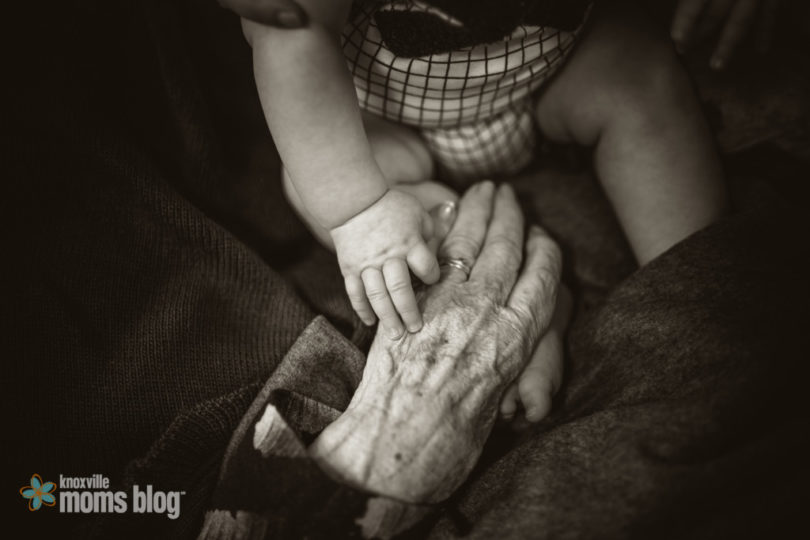 A quick glance at my desktop calendar gave me a short pang of panic. This blog post was due in 24 hours, and I didn’t have any (good) ideas. I took to Facebook and asked my fellow Knoxville Moms Blog Contributors: What do you want to read from a 40-year-old mom of teens?
A quick glance at my desktop calendar gave me a short pang of panic. This blog post was due in 24 hours, and I didn’t have any (good) ideas. I took to Facebook and asked my fellow Knoxville Moms Blog Contributors: What do you want to read from a 40-year-old mom of teens?
One replied: “If I knew then what I know now…”
As soon as I read that line, a memory flashed in my mind of the last heart-to-heart conversation I had with my mother-in-law before she died, the one where we both apologized for thinking the worst of each other.
Yeah. If I knew then what I know now, I wouldn’t have behaved in a way that required an apology.
My husband and I were raised differently. On account of my Army brat upbringing, developing one’s independence was key. I was a latchkey kid, doing my own laundry by upper elementary age and keeping up my grades without asking for help. I got a job at 16 to pay for the things I wanted, and when Dad told me to finish college in four years, I finished college in four years. My parents worked and traveled, and my sister and I took care of our responsibilities because we had been expected to.
My husband had a much more interconnected family with hands-on parenting. They ate dinner together every night, and my future-mother-in-law worked a full-time job while still doing the bulk of the housework. I will never forget the day my then-boyfriend and I were in his bedroom and his mother casually walked in with his neatly folded laundry and started putting it away in his dresser drawers. My mother had not touched my laundry in years! Am I dating a guy who can’t do his own laundry? I wondered.
Neither of these upbringings was extreme in the sense of all good or all bad. I loved being raised to do things for myself, but, looking back, there were moments and seasons of life when I really needed my parents to step in. My husband had a childhood built on togetherness, but there were moments and seasons when his parents should’ve let him figure things out for himself. Today, we tag-team parent to the middle — a little bit of independence paired with a little bit of hand-holding.
That being said, when we adopted our firstborn, I didn’t ask for help the way many first-time moms do. I talked to my sister, who already had a three-year-old, and I crowd-sourced friends when I had a problem to solve. But overall, I went with my gut and worked out dilemmas as they arose. This is how I’d always functioned.
However, that didn’t keep my mother-in-law from consistently offering her two cents on what I felt was every single topic related to child-rearing. At 25-years-old, it offended me that she insisted on being so involved. It wasn’t long before I resented her, translating all that well-meaning advice into an opinion that she didn’t actually hold: that I couldn’t raise my kids without her help.
My immaturity drove a wedge between us, putting my husband in a tough spot, and it got worse when our second child was born.
Granted, she was doing what she’d always done — helping, advising, intervening — and my parents did what they’d always done — watched from afar and enjoyed the grandboys when they could. My husband’s and my styles of upbringing were playing out a second time, and I grew bitter. Too often, it showed on my face and in my tone.
Fast-forward several years. Just as we prepared to move across the country, our family received terrible news: My mother-in-law was diagnosed with brain cancer. Within two years, she would be gone.
The shock of such news put everything into its proper perspective, and it was a short six weeks after her surgery, when her mind was clear and we were settling down in Texas, that we had the best conversation she and I ever had. I apologized to her for my selfishness, for not interpreting her advice and intervention as true love and devotion, for letting my heart become bitter towards her. She apologized for all the times she involved herself in our marriage and child-rearing, that she never meant to cause a problem, that she loved us so much and this was how it manifested. She told me she was proud of us, and then she said something I’ll never forget: “You’re a wonderful mother.”
We both cried in that beautiful, heart-wrenching place of honesty. She had only seven years with our oldest son and a brief four years with our youngest, who, sadly, doesn’t remember her. They were robbed of a wonderful, devoted grandmother. Countless times since her passing I’ve wished for her to still be here.




















